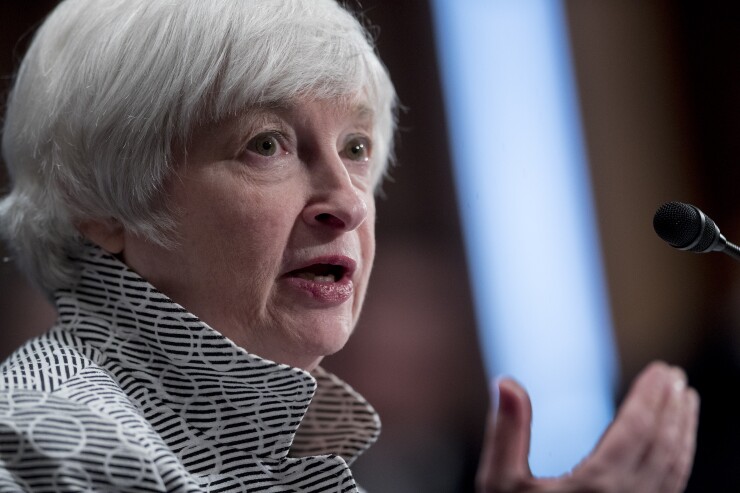WASHINGTON — Treasury Secretary Janet Yellen outlined the Treasury Department’s approach to regulating digital assets, marking the first time she’s substantially laid out her thoughts on the issue since President Biden’s
Yellen’s remarks, delivered at American University Thursday morning, largely reflected the priorities previously laid out by the Biden administration. She called for a “comprehensive” regulatory regime developed around potential risks posed by cryptocurrency and certain activities, not the technology itself.
“Our regulatory frameworks should be designed to support responsible innovation while managing risks — especially those that could disrupt the financial system and economy,” she said.

To some extent, Yellen has moderated her views on cryptocurrency. She described herself as
In her speech, Yellen discussed benefits of the rise in cryptocurrencies, but also talked about the risks the explosive growth poses to consumer protection and financial stability. She cited risks in stablecoins as an example.
"To peg their stablecoin to a dollar, most issuers say they back their coins with traditional assets that are safe and liquid," she said. "This way, whenever you want to trade your stablecoin back into a dollar, the company has the money to make the exchange. But, right now, no one can assure you that will happen. In times of stress, this uncertainty could lead to a run."
Specifically, Yellen called out the impact of cryptocurrency on banks and financial regulation.
“As banks and other traditional financial firms become more involved in digital asset markets, regulatory frameworks will need to appropriately reflect the risks of these new activities,” Yellen said. “And, new types of intermediaries, such as digital asset exchanges and other digital-native intermediaries, should be subject to appropriate forms of oversight.”
She also said that regulators “must also be prepared for possible changes in the structure of financial markets” due to the rise of digital assets.
“For example, some have suggested that distributed ledger technology could reduce concentration in financial markets,” Yellen's remarks say. “While this could make markets less vulnerable to the failure of any particular firm, it is critical to ensure we maintain visibility into potential buildups of systemic risk and continue to have effective tools for tamping down excesses where they arise.”
Yellen’s speech gave guidelines and general principles — rather than specific instructions — for agencies to follow in response to Biden’s executive order, which tasks several financial regulatory agencies with producing reports and thinking about how to incorporate digital assets into their work.
She continued the Biden administration’s call for comprehensive legislation to address digital assets, particularly around stablecoins, but did not comment on any pending legislation. Several lawmakers, including Senate Banking Committee ranking member
“The hope is that the principles that she will lay out will help to drive forward the conversation around whether legislation is necessary and if so, in what form those legislative recommendations will come to fruition,” a Treasury official said.
Yellen said that the Treasury Department is working with Congress "to advance legislation to help ensure stablecoins are resilient to risks that could endanger consumers or the broader financial system."





